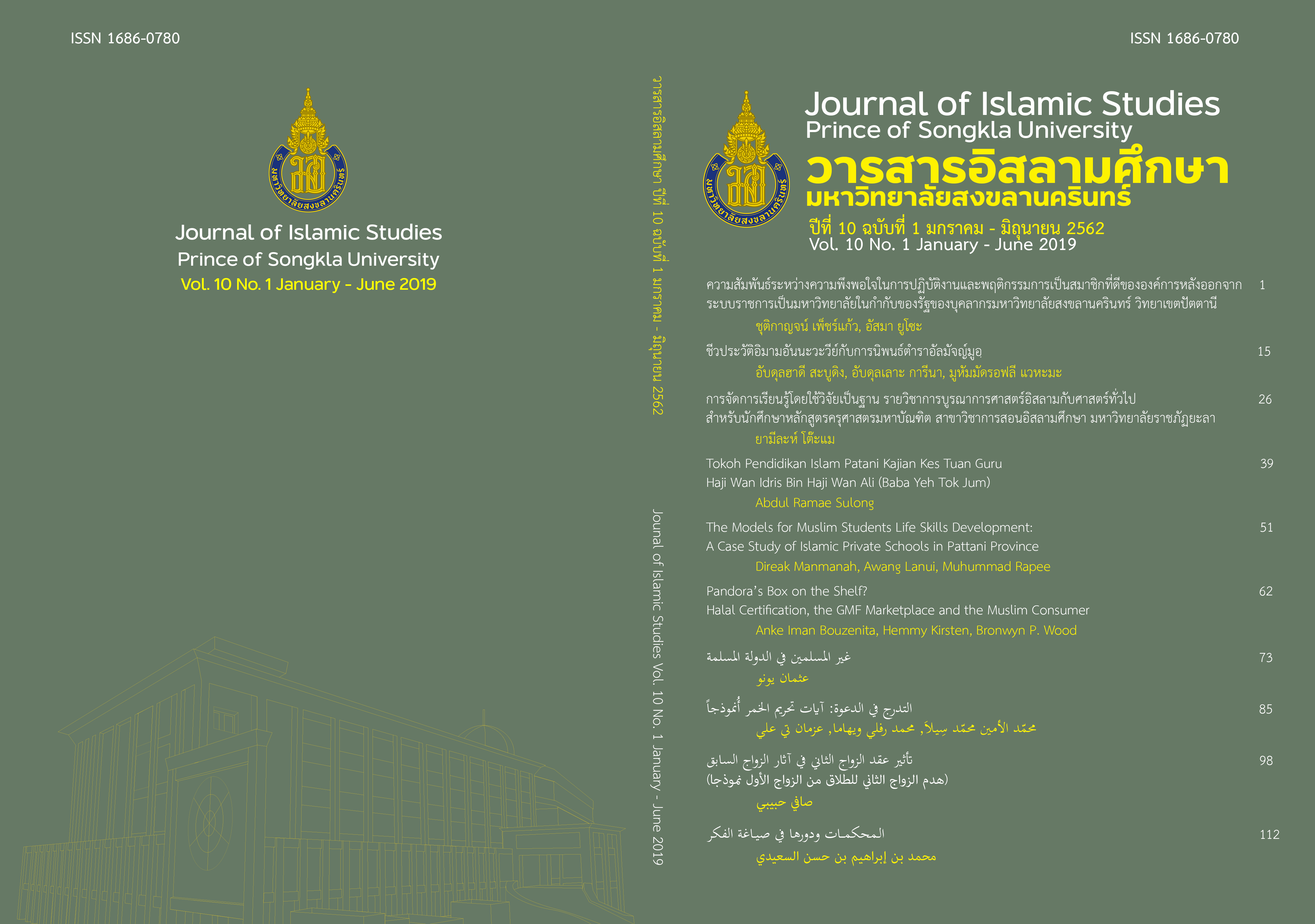The Models for Muslim Students Life Skills Development: A Case Study of Islamic Private Schools in Pattani Province
Keywords:
Life Skill, Muslim Youth, Islamic Private SchoolsAbstract
This qualitative study aimed to investigate the development of life skills, conditional factors relating to Muslim youth life skills development within three different sizes of Islamic private schools in Pattani Province. The samples of the study were 16 school administrators, teachers, school counselors, religious leaders, community leaders, students and alumni per each school, and three experts. The data were collected through an in-depth interview, focus group, and observation. This study revealed that in terms of school administration. 1) The three schools were administrated differently. Regarding the content of learning and teaching management, 2) the schools integrated religious subjects with the academic ones. There was also the integration of the life skills development with the subject content. On the contrary to these, there was somehow different approach of the integration. The main features of learning promotion activities were similar, which mostly the project-based learning (PBL), teamwork learning, self-learning, reflective learning, and activity-based learning were utilized. Furthermore, the study also demonstrated that the main common features of the community relations activities were hands-on learning, community-based learning, participatory learning, and social support. Within three schools’ co-factors/conditions consisted of kinship organizational culture, role model teachers, and relationship and learning from within the school peer groups. In the meanwhile, the outside three schools’ co-factors/conditions included the relationship and learning from outside of the school peer groups. Therefore, this study recommended that the schools should encourage their students to employ the Islamic teachings within the schools, and also should boost them to translate the teachings into their families, communities, societies, and other related organizations.
References
AMRON. (2010). ASEAN Islamic education: change from within through education. Proceeding of The AMRON International Conference: Walailuk University, Nakhon Si Thammarat. Thailand.
Baka, D. and Laeheem, K. (2008). The study of Thai Muslim youth way of life for peace building in the three southern border provinces. Bangkok: National Research Council of Thailand and Prince of Songkla University.[in Thai]
Beraheng, H. (2010). Education in Islam: concepts and learning process. (Dissertation of Master of Arts in Islamics Studies). Prince of Songkla University.[in Thai]
Che-leng , I. (2014). Administrators’ roles in promoting students’ ethics in Islamic private school under private education office, Pattani province. (Dissertation of Master of Arts in Islamic Educational Administration and Management). Prince of Songkla University.[in Thai]
Department of General Education. (2002). The guidelines for organising a project of school-based management strengthening promotion in accordance with strategy 5: structure adjustment for decentralisation administration, fiscal year 2002. Bangkok: Kurusapa Ladphrao. [in Thai]
Hayisa-ma-ae, S., et al. (2009). Research report of integrated teaching and learning management utilising Islamisation within secondary school in Malaysia. Bangkok:The Thailand Research Fund (TRF). [in Thai]
Jehmama, et al. (2011). Process of Conveying Islamic Doctrinal Practices for the Youth in Private Islamic School in the Three Southern Border Province. (Dissertation of Master of Education in Education for Human Development). Thaksin University.[in Thai]
Khan, S. (2009). The application of Quraan and Hadith in the teaching of life skills in Muslim schools in South Africa (Dissertation of Master of Arts in Islamic Studies). University of South Africa.
Languteh, S. (2011). Teenagers and the phenomenon of changing era. The Annual General Meeting Report of Young Muslim Association of Thailand, 2011. [in Thai]
Leaheem, K. and Baka, D. (2010). The study of the Muslim youth way of life for peace building in the three southern border provinces.Songklanakarin Journal of Social Sciences and Humanities, 16(6).,973-988. [in Thai]
Mahama, M. (2008). Islam is the way of life.Songkhla: Southern Health System Research Institute. [in Thai]
Nakornthap, A. et al. (2007). The project report of research and development of local learning management in the three southern border provinces.Bangkok: Thailand Research Fund (TRF). [in Thai]
Narongraksakhet, I. (2008). The philosophy of Islamic education. College of Islamic Studies. Prince of Songkla University, Pattani Campus. [in Thai]
Office of the Education Council. (2012). The educational management for sustainable development. The 2012 Annual Report. Office of the Education Council, Ministry of Education. [in Thai]
Waesoh, S. (2006). Administrative trends of the Islamic private schools in three southern border provinces from B.E. 2548 to B.E. 2558. (Dissertation of Master of Education in Educational Administration). Prince of Sonkla University.[in Thai]
Wasi, P. (2000). Inspire for learning reform to new millennium. Bangkok: Kurusapa Ladphrao. [in Thai]
WHO. (1994). Life skill education for children and adolescents in school. London: Department of Health.
Downloads
Published
How to Cite
Issue
Section
License
Copyright (c) 2019 Journal of Islamic Studies, College of Islamic Studies, Prince of Songkla University, Pattani Campus

This work is licensed under a Creative Commons Attribution 4.0 International License.
All articles Published in The Journal of Islamic Studies are author’s opinions, and not the responsibility of the Faculty of Islamic Sciences nor the editorial board. However any citation should be referred to the journal.
















